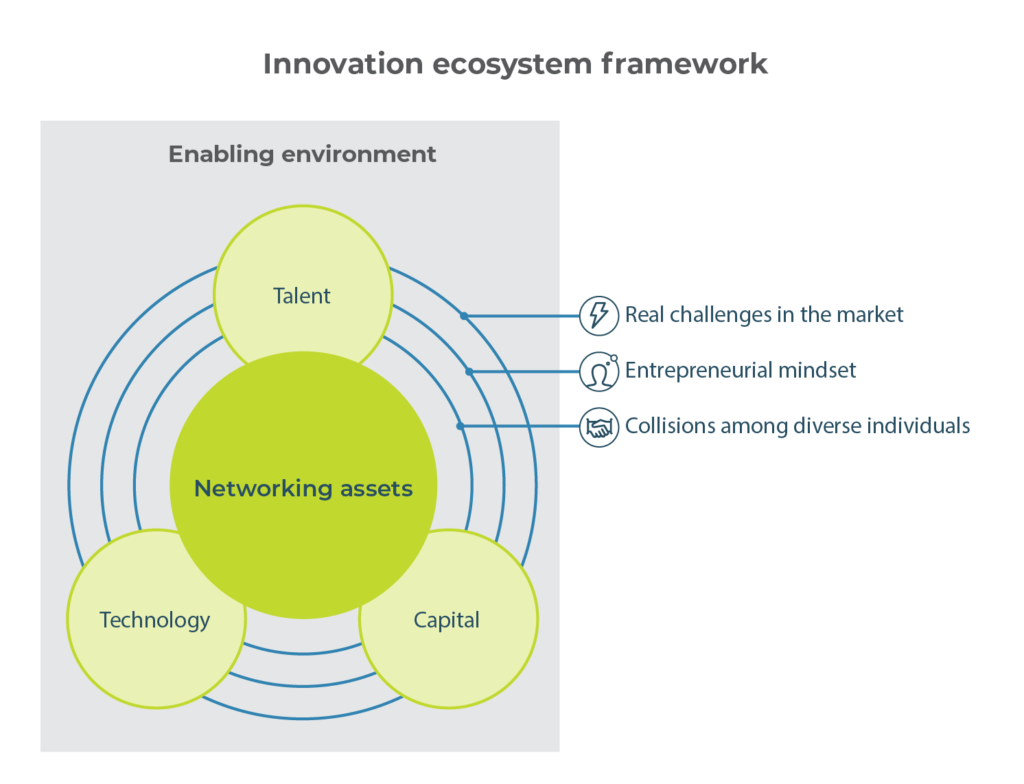Innovation ecosystems in sub-Saharan Africa: How to enable flourishing innovation?
Innovation ecosystems in sub-Saharan Africa: How to enable flourishing innovation?
31 August, 2020 •Insights from Cape Town, Nairobi and Lagos
With a growing number of tech start-ups, hubs, accelerators and other innovation facilitators, Cape Town, Nairobi and Lagos have put themselves on the map as important innovation ecosystems in Africa. Innovation is a key force for economic growth and development. Not only can it lead to greater efficiencies and productivity, it also stands to fundamentally change how products and processes benefit individuals’ lives. And if done well, solving the most pertinent challenges in an economy, innovations of various kinds can lead to more inclusive economies.
Vitally, this can’t happen in a vacuum. Innovation ecosystems are the environment within which innovation takes place. We define innovation ecosystems as a web of interconnected factors that turns a particular location into an engine room for coming up with new solutions and successfully taking those solutions to market. These ecosystems are also characterised by an entrepreneurial mindset and a dynamic flow of ideas, capital and labour.
Given that innovation plays a critical role in driving the digital economy in Africa, we set out to understand the factors and forces that shape the innovation ecosystems, and specifically the interdependencies and dynamics. We applied a collaborative systems practice approach to diving deep into the three top innovation ecosystems in sub-Saharan Africa: Cape Town, Nairobi, and Lagos. The COVID-19 pandemic forced us to convene ecosystem stakeholders in Nairobi and Lagos virtually, and we were pleased to enjoy exceptionally high levels of engagement from our focus group participants.
Through our project, we developed the following framework for understanding what makes up innovation ecosystems, and what causes them to thrive.

At the foundation of any thriving innovation ecosystem is an enabling environment, within which a number of key building blocks are placed: talent, technology and capital – all with sufficient mobility. An ecosystem is greater than the sum of its parts, however, and the factor that makes the ecosystem come to life is the fourth and most important building block: networking assets. Networking assets are the component that links the various ecosystem building blocks together, and thus generates a multiplier effect. These assets can be tangible spaces or events, or intangible networks and relationships. While these four building blocks certainly affect the ease of innovation in an ecosystem, they don’t necessarily guarantee the quality of innovation. The quality, robustness and sustainability of innovation are influenced by a number of intangible cultural factors, including real challenges in the market that need solving; an entrepreneurial mindset; and collisions among diverse individuals.
In this report, we describe the main themes that impact the tech innovation ecosystems in Cape Town, Nairobi and Lagos on the basis of this framework. We show how the different building blocks manifest in each city and synthesise these into overarching findings for innovation ecosystems in sub-Saharan Africa:
- Sufficient digital infrastructure is an important market prerequisite, but its absence should not be seen as a barrier to innovation.
- Supportive government policies are critical, and their importance is most clearly demonstrated where they are absent.
- Growing talent is critical for innovation. The demand for skilled talent will continue to rise, at least for the near future.
- Access to finance continues to be a major challenge faced by African tech innovation ecosystems, more specifically the lack of seed- and early-stage funding. Unnecessary friction is created by entrepreneurs’ lack of understanding and experience of different financing options and their limitations.
- Ecosystem facilitators are central to thriving ecosystems. However, the services they provide and the role they play need to evolve alongside the ecosystem. In initial stages, more facilitators may be better, but over time such increasing numbers may give rise to coordination challenges and duplication of efforts.
We conclude by providing a set of key recommendations for ecosystem stakeholders interested in supporting flourishing innovation, namely:
- The social dimension of an ecosystem is critical: focus strongly on establishing and facilitating the right networks and relationships within the ecosystem.
- Invest in additional training, including both technical (hard) and entrepreneurial (soft) skills.
- Remove friction in the funding process by increasing information and communication between funders and entrepreneurs.
Read more city-specific insights:
- Cape Town (1): Strengthening inclusive innovation in a divided city
- Cape Town (2): Maintaining inclusive innovation under COVID-19
- Nairobi: Shapeshifting into maturity: Hubs in the Nairobi innovation ecosystem
- Access an interactive map of the Nairobi ecosystem here
- Lagos: “If you can make it here, you’ll make it anywhere”
insight2impact (i2ifacility) was funded by Bill and Melinda Gates Foundation in partnership with Mastercard Foundation. The programme was established and driven by Cenfri and Finmark Trust.





